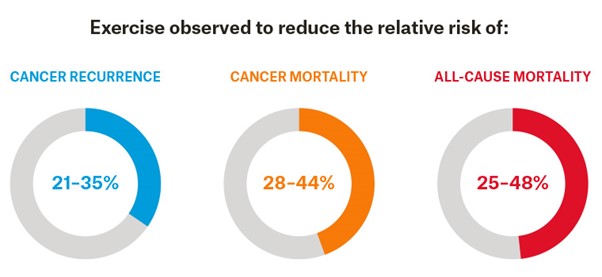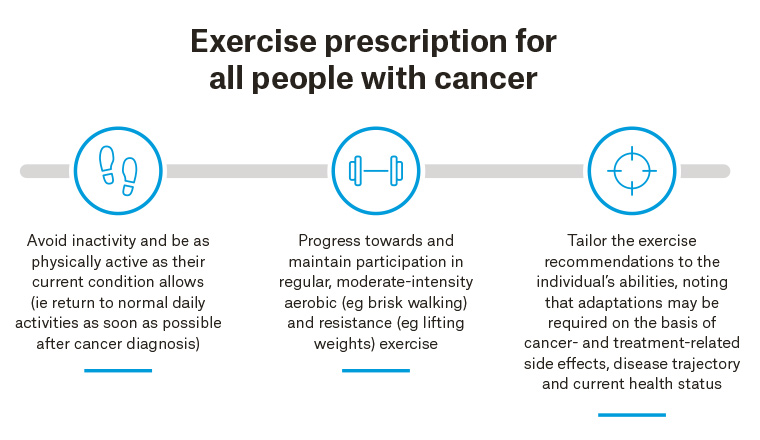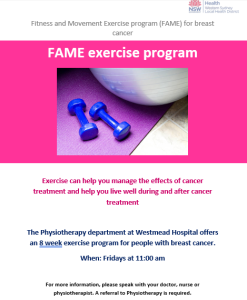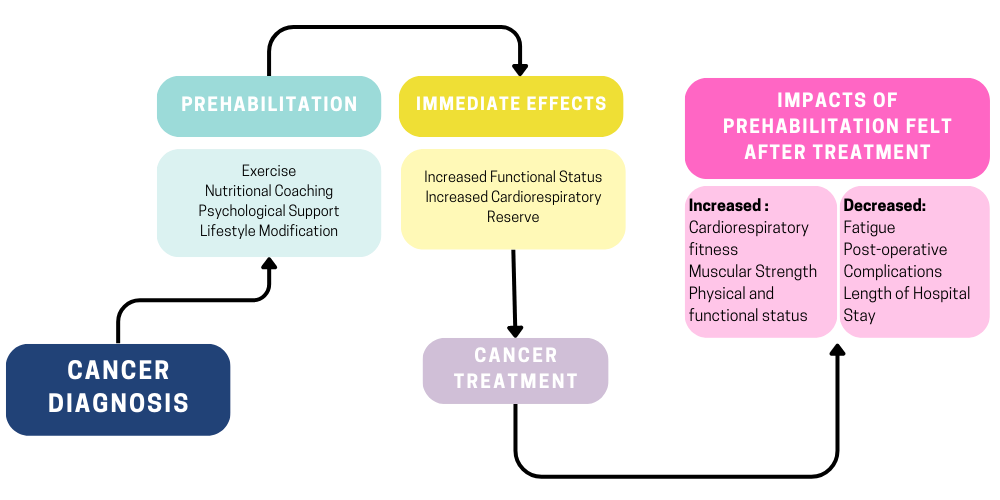Now that you have your treatment plan, it’s time to prepare your mind and body for treatment. This is known as ‘Prehabilitation’
The following resources will help prepare yourself for breast cancer treatment mentally and physically. These resources are beneficial for any type of breast cancer treatment including surgery, chemotherapy, endocrine therapy, and radiation therapy .
Information on this Page:
1. What is Prehabilitation?
2. BCI Maple Tree Program
3. Movement and Exercise
4. Gathering your Support Network
5. Diet and Nutrition
6. Mental and Emotional Wellbeing
7. Workplace and Employment
If you have NOT had your initial appointment yet, visit “Before Your First Appointment”
1. What is Prehabilitation?
Prehabilitation is any activity that aims to build your tolerance and resilience to breast cancer treatment.
Examples of prehabilitation activities includes:
- quitting smoking and vaping
- cutting back or ceasing drinking alcohol
- eating less fast food or soft drink
- walking more
- starting shoulder range of motion exercises
- joining a support group
- continuing to work
- getting into a good skincare routine
Why is it so important?
There is a lot of research that tells us that ‘prehab’ has many benefits including increasing the effectiveness of treatment, reduces complications of treatment and side effects, improves mental health and wellbeing, and helps prevent cancer returning (recurrence).
Who should do prehabilitation?
Everyone with a new diagnosis of breast cancer or DCIS!
It does not matter your age, what type of tumor you have, your level of fitness, or your treatment plan
When should it begin?
Immediately or soon after diagnosis.
2. BCI Maple Tree Program
Because there is so much evidence for the benefits of exercise during treatment, the Clinical Oncology Society of Australia states: ”exercise should be prescribed as part of the routine cancer care”.
“Based on what the science tells us, exercise is the best medicine people with cancer can take, in addition to their cancer treatments, to reverse treatment related side-effects, slow the progression of their cancer, increase quality of life and improve the chances of survival” – Clinical Oncology Society of Australia.
To view the minimum exercise recommendations for someone with cancer, take a look at the ‘Moving through Cancer’ factsheet.

It is recommended that people with cancer are supported in the following ways:
- Exercise is a part of your treatment plan and is an accompaniment to other treatments.
- Prescribe exercise to all people with cancer
- Refer patients to an exercise physiologist and/or physiotherapist with experience in cancer
care
At Westmead BCI we do this by participating in the Maple Tree Program.
Maple Tree is a program in which people with a breast cancer diagnosis receive an ‘Exercise Prescription’ tailored to their individual needs. A specialized physiotherapist will conduct an assessment of your needs and goals and will provide a 12 week prescription with regular check ins.
This program is FREE and is recommended to begin at the beginning of treatment.
Please contact the BCI Breast care nurses to be referred to the Maple Tree Program.
bci-breastcarenurses@health.nsw.gov.au

3. Movement and Exercise Resources
The Clinical Oncology Society of Australia and Breast Cancer Network Australia have released statements and recommendations for exercise throughout and beyond breast cancer treatment.
GET HEALTHY FREE HEALTH COACHING
Set your own goals, and receive confidential online and phone health coaching support. They have a specific cancer care program which a Breast Care Nurse or your GP will need to use to refer you. Download form HERE
YMCA ENCORE BREAST CANCER EXERCISE PROGRAM
FREE breast cancer exercise and wellness program supports women in their breast cancer journey. Encore can help strengthen and tone arms, shoulders and chest, regain mobility, and improve general fitness.
HEART FOUNDATION – FIND A WALKING GROUP
simply enter your postcode and find a FREE local walking group convenient for you
CANCER COUNCIL FOLLOW ALONG VIDEOS
follow along for all fitness levels including CORE, UPPER BODY, and LOWER BODY
BEGINNER MAT YOGA
follow along video
FAME FOR BREAST CANCER PROGRAM – WESTMEAD HOSPITAL
Run by the physiotherapy department at Westmead, an 8 week program specifically for women with breast cancer. Ask your Breast Care Nurse to be referred.
2. Gathering your Support Network
CanDo APP
Do you need help but find it difficult to ask? Maybe you want to help but don’t know how?
CanDo is a FREE app that is the bridge between people going through treatment for cancer and their team of willing helpers.
The CanDo app coordinates team and task management, without awkward conversations.
GATHER MY CREW APP
The Gather My Crew app links people who need help with their network of friends and family who want to help.
During tough times, people often say ‘let me know what I can do’ – but rarely is that offer turned into the support that is needed. That is where the Gather My Crew app comes in.
It is a simple and convenient way to organise transport, meals, help with the kids, social visits, grocery shopping or whatever else you need.
PODCAST: SETTING HEALTHY BOUNDARIES
After a cancer diagnosis and treatment, you often discover you are not able to operate at the same level as you did pre-cancer, physically, cognitively and emotionally. In this episode, Charlotte explains the importance of boundary setting in self-care, particularly in relation to the challenges in continuing to care for loved ones while navigating a cancer experience, and the role of guilt in this.
4. Diet and Nutrition Resources
There isn’t a specific diet to follow once you have a breast cancer diagnosis however maintaining the general principles of healthy eating will help you to stay well during treatment and will aid recovery.
- HOW HEALTHY ARE MY HABITS?
healthy habits quiz from ‘Healthy Eating, Active Living’ can help you check in with your current habits and see where you might be able to improve.
- 8700 App – KILOJOULE TRACKER
understand your daily energy needs using the Kilojoule Calculator. Search over 3,000 products from larger Australian fast food and snack chains using the Fast Food Search - MEAL AND SNACK IDEAS
When you feel too tired or unwell to shop for food or cook, or if you’re missing meals while having treatment, the quick meal and snack ideas in this section may help.
5. Mental and Emotional Wellbeing
Much of your journey will be mental as much as it is physical. There are many ways to care for your spiritual and mental wellbeing including connecting with others who have been through a similar experience, and relaxation techniques.
CANCER CONNECT
Cancer Connect is a free and confidential telephone peer support service that connects someone who has cancer with a specially trained volunteer who has had a similar cancer experience.A Connect volunteer can listen with understanding and share their experiences and ways of coping. They can provide practical information, emotional support and hope. Many people newly diagnosed with cancer find this one-to-one support very beneficial.
GUIDED MEDITATION – preparing for procedures breathing exercise
This 6-minute guided meditation will help you focus on your breathing to feel calm before and during your doctor’s appointment or procedure. You can do this mindful breathing exercise on its own or as an introduction to guided meditation.
GUIDED MEDITATION – managing pain breathing exercise
This 32-minute guided meditation will help you soothe anxiety and uncomfortable sensations in your body before a painful procedure or when you’re in pain.
TALK TO A COUNSELLOR – BEYOND BLUE
FREE telephone and online counselling service is open 24/7 for everyone in Australia.
SELF CARE PLANNING WORKSHEET
Having Self-Care practices built in to our routine is one way we can help keep our stress levels manageable.
PODCAST: UPFRONT ABOUT BREAST CANCER – The Snow Globe Effect, Change of Perspective
Hosted by Dr Charlotte Tottman, we hear about the Snow Globe Effect, an analogy Charlotte uses to explain how a cancer experience can change a person’s perspective, values, priorities and how they live their life.
6. Workplace and Employment
We encourage people with cancer to continue working throughout their treatment as a form of pre-habilitation wherever possible. It can good social outlet, helps you keep balance in your life, and may alleviate some financial concerns and stresses.
- HELPING A FRIEND OR COLLEAGUE
This quick-reference brochure is useful to provide to your work colleagues in how they can support you during this time. - I AM AN EMPLOYER
A quick-reference guide for your manager or boss - FAIR WORK COMMISSION – Temporary Absence from Work
Your rights and responsibilities under the Fair Work Act - WORKPLACE ISSUES
The cancer council can provide advocacy and legal support if you need it in your workplace. Simply call 13 11 20 and request workplace advocacy
For specific information on managing the side effects of surgery, chemotherapy & systemic therapy, radiotherapy, and hormone (endocrine) therapy visit the “TREATMENT” page

